Featured
 Republican Party is now a terrorist organization — and none of this is a surprise. By Chauncey Devega / Salon
Republican Party is now a terrorist organization — and none of this is a surprise. By Chauncey Devega / Salon
In total, the Republican Party has created a precedent that right-wing political violence and terrorism, including coups and other attempts to overthrow legal elections, are now acceptable in the United States — as long as they are perpetrated by Republicans and their allies against Democrats and others deemed to be “un-American.”
This is the essence of fascism and authoritarianism. Such beliefs and values have broad support among Republican voters and other members of the right wing more generally. Read more
Political / Social
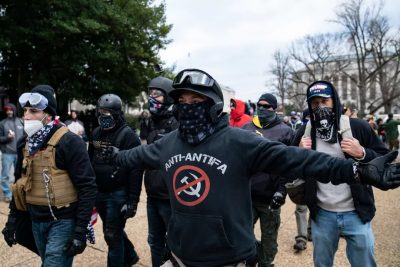 A new lawsuit targets Trump and the Proud Boys under a law enacted to stop the KKK. By Nicole Narea / Vox
A new lawsuit targets Trump and the Proud Boys under a law enacted to stop the KKK. By Nicole Narea / Vox
Though the Senate voted to acquit former President Donald Trump of inciting the Capitol insurrection on Saturday, some Democrats are still seeking to ensure that he and his associates, as well as the far-right hate groups that participated in the attack, are held accountable. Rep. Bennie Thompson, the chair of the House Homeland Security Committee, sued Trump, his personal lawyer Rudy Giuliani, and two far-right groups, the Proud Boys and the Oathkeepers, on Tuesday, claiming that they conspired to interfere with Congress’s certification of the 2020 election results.
The complaint — which was filed in collaboration with the NAACP in Washington, DC, federal court and seeks financial damages — argues that the groups pursued a “common plan” that culminated in the “Save America” rally on January 6 and the subsequent storming of the Capitol. Read more
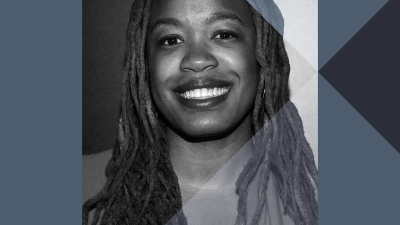 What Racism Costs All Americans. By Ezra Klein / NYT podcast
What Racism Costs All Americans. By Ezra Klein / NYT podcast
“The American landscape was once graced with resplendent public swimming pools, some big enough to hold thousands of swimmers at a time,” writes Heather McGhee in her new book, “The Sum of Us: What Racism Costs Everyone and How We Can Prosper Together.”
I asked McGhee to join me on my podcast, “The Ezra Klein Show,” for a discussion about drained-pool politics, the zero-sum stories at the heart of American policymaking, how people define and understand their political interests, and the path forward. Listen here
Related: America’s Brutal Racial History Is Written All Over Our Genes. B
 How to have more productive conversations about racism: Stop focusing on individual intent. By Patricia Roberts-Miller / Salon
How to have more productive conversations about racism: Stop focusing on individual intent. By Patricia Roberts-Miller / Salon
So, someone said they thought something we said or did was racist. Our first impulse is to say we aren’t racist, and therefore we could never have intended to do or say something racist. And, therefore, what we said or did can’t have been racist. But racism doesn’t require that somebody consciously decide to do something racist.
Racism can be built into systems even without there being any individuals who have the conscious intent to be racist. Read more
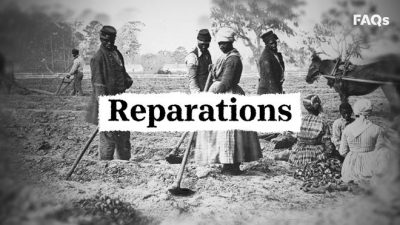 After racial unrest across US, Congress takes another look at reparations. By Beatrice Peterson / ABC News
After racial unrest across US, Congress takes another look at reparations. By Beatrice Peterson / ABC News
H.R. 40’s lead sponsor, Rep. Sheila Jackson Lee, D-Texas, told ABC News on Tuesday the subcommittee on the Constitution, Civil Rights, and Civil Liberties hearing would “not be a hearing of anger and anguish, it will be a factual hearing, the witnesses come with facts, United Nations will be there and indicate that reparations is an international concept of healing, repairing and restoring.”
The bill seeks to establish a commission to study “and consider a national apology and proposal for reparations for the institution of slavery, its subsequent de jure and de facto racial and economic discrimination against African Americans, and the impact of these forces on living African Americans, to make recommendations to the Congress on appropriate remedies, and for other purposes,” according to H.R. 40’s text. Read more
Related: D.C.’s racial equity agenda demands action now. By Kenyan R. McDuffie / Wash Post
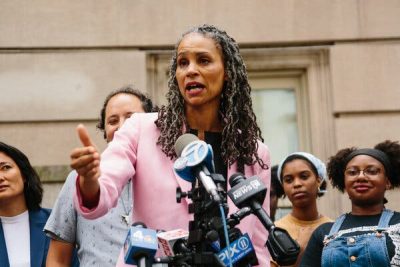 Maya Wiley on Her Campaign to Be NYC’s Next Mayor. By Rebecca Traister / New York Magazine
Maya Wiley on Her Campaign to Be NYC’s Next Mayor. By Rebecca Traister / New York Magazine
Wiley is a civil-rights activist, lawyer, New School professor, and MSNBC pundit who served as legal counsel to Mayor Bill de Blasio from 2014 to 2016. As she prepared to enter the race, her path appeared straightforward. In any other election year, her candidacy — as a nationally recognized activist with a career focused on race, poverty, and police reform — would have been seen as practically radical. Read more
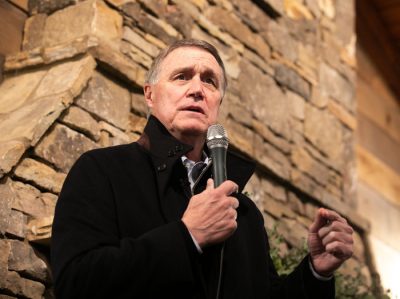 Former Sen. David Perdue Files For Potential 2022 Comeback Bid In Georgia. By Barbara Sprunt / NPR
Former Sen. David Perdue Files For Potential 2022 Comeback Bid In Georgia. By Barbara Sprunt / NPR
David Perdue has taken the first step on the road back to the U.S. Senate, filing paperwork with the Federal Election Commission on Monday to set up a potential political comeback in the Peach State in 2022. “This was simply a necessary legal step that will allow me to continue to keep all options open,” Perdue said of his paperwork in a tweet on Tuesday afternoon. If Perdue decides to run, he’d be seeking the Republican nomination to take on Democratic Sen. Raphael Warnock, who defeated incumbent Republican Kelly Loeffler by two percentage points in a special election last month. Read more
 Civil Rights Group Launches Police Use of Force Database. By Josiah Bates / Time
Civil Rights Group Launches Police Use of Force Database. By Josiah Bates / Time
There is no currently country-wide law that requires police departments to document use of force incidents; some states’ laws mandate reporting of a sort, but in different formats and to different extents. In 2015, the FBI created the National Use of Force Data Collection and began collecting data in 2019, but as of 2020, only 40% of law enforcement agencies in the country had actually sent data to the FBI. But with Accountable Now, a new open-source police data collection tool, the Leadership Conference hopes to provide far greater transparency on how police departments across the country are operating—and compiling information that departments typically doesn’t share widely. Read more
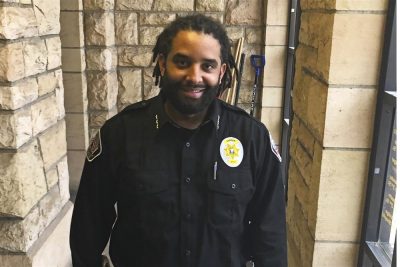 After shooting, unrest, Wyoming gets its first Black sheriff. By The AP and NBC News
After shooting, unrest, Wyoming gets its first Black sheriff. By The AP and NBC News
As a student at the Wyoming Law Enforcement Academy, Aaron Appelhans used to look at the photos of past graduating classes hanging on the wall. “I got to see, for the most part, ain’t a whole lot of people that looked like me around here,” he recalled of the mainly white faces. A decade later, Appelhans was appointed Wyoming’s first Black sheriff, a post he took months after fury over racist policing roiled U.S. cities. His turf includes one of Wyoming’s last Democratic strongholds, but the state is overwhelmingly conservative and white and he’s already faced a racist remark from a lawmaker. Read more
 History of abuses behind Black Americans’ COVID vaccine skepticism. By Javonte Anderson / USA Today
History of abuses behind Black Americans’ COVID vaccine skepticism. By Javonte Anderson / USA Today
Since the country’s inception, the American medical institution has subjected Black bodies to abuse, exploitation and experimentation. Corpses being pulled from the ground for scientific study. Black women being sterilized without their knowledge and robbed of the opportunity to bear children. An entire Black community misled into believing they were immune from a fatal illness. Time and time again, Black people have been betrayed by the medical establishment, fostering a lingering, deep-rooted mistrust. Read more
Related: Tuskegee Study Deters Some Black People From Getting COVID-19 Vaccine. By Debbie Elliott / NPR
 How public schools fail to recognize Black prodigies. By Donna Ford / The Conversation
How public schools fail to recognize Black prodigies. By Donna Ford / The Conversation
The No. 1 reason for the underrepresentation of Black students in gifted education is the lack of teacher referrals, even when Black students are highly gifted. I definitely think stereotypes and biases hinder educators from seeing Black students’ gifts and talents. In most schools in the U.S., if you are not referred by an educator, you will not move through the identification pipeline for gifted education programs and services, as well as Advanced Placement. It starts and it stops with teachers. Read more
 He became one of the Navy’s first Black four-star admirals. The military has work to do on diversity, he says. By Dan Lamothe / Wash Post
He became one of the Navy’s first Black four-star admirals. The military has work to do on diversity, he says. By Dan Lamothe / Wash Post
The young midshipman heard the question but kept walking as he neared a group of White students at the Naval Academy. “You know, the only reason you’re here is the quota system, right?” one of them asked. Cecil Haney, 65, went on to become one of the first Black four-star admirals in Navy history, serving as the commander of the U.S. Pacific Fleet and the U.S. Strategic Command, where he oversaw nuclear weapons before retiring in 2017. Read more
Historical / Cultural
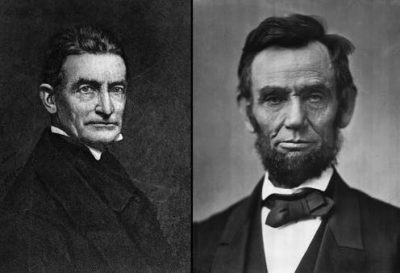 John Brown was a violent crusader, but he blazed a moral path that the cautious Lincoln followed to end slavery. By Adam Seagrave / The Conversation
John Brown was a violent crusader, but he blazed a moral path that the cautious Lincoln followed to end slavery. By Adam Seagrave / The Conversation
One of the most underappreciated figures in the nation’s history, John Brown, has been introduced to Americans by the recent Showtime series “The Good Lord Bird,” based on the James McBride novel of the same name. Too often dismissed as a failed zealot, Brown was an unconventional anti-slavery leader who blazed a trail that Abraham Lincoln would follow just a few years later. Read more
 One of the oldest Black churches in US uncovered in Williamsburg, Virginia. By Craig Melvin / Today
One of the oldest Black churches in US uncovered in Williamsburg, Virginia. By Craig Melvin / Today
Members of one of the nation’s first Black churches – a congregation founded in 1776 – are working with Colonial Williamsburg to add their story to the narrative of that historic town. Craig Melvin reports as TODAY’s Changemakers series for Black History Month continues. Watch here
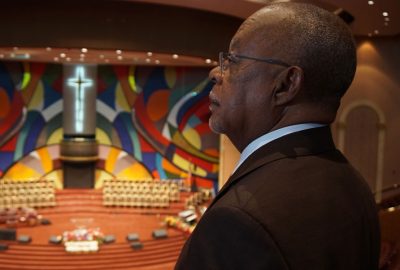 PBS’ ambitious & fraught “Black Church” takes a tour of America’s complex history, music and faith. By Melanie McFarland / Salon
PBS’ ambitious & fraught “Black Church” takes a tour of America’s complex history, music and faith. By Melanie McFarland / Salon
“The Black Church” is a celebratory tour of American history, examining the regional contributions to the larger culture of worship, and the churches themselves. Some of my favorite moments in the documentary series are the pensive views inside churches across the country interspersed throughout, with the camera work ensuring that even the most modest praise houses glow.
In this way Gates presents individual churches as distinct personalities evocative of the community history from which they sprang. If there is a designated star among them it is Charleston, South Carolina’s “Mother Emanuel” African Methodist Episcopal Church. Parts 1 and 2 of “The Black Church” premiere Tuesday, Feb. 16 at 9 p.m. followed by Parts 3 and 4 on Wednesday, Feb. 17 at 9 p.m. on PBS. Read more
Related: Black churches in America are having a moment. By John Blake / CNN
 A Black Soldier’s Heroism, Overlooked in 1965, May Finally Be Lauded in 2021. By Dave Phillipps / NYT
A Black Soldier’s Heroism, Overlooked in 1965, May Finally Be Lauded in 2021. By Dave Phillipps / NYT
After the Army, Mr. Davis started a small newspaper in Virginia called The Metro Herald, for 30 years regularly publishing articles about the accomplishments of Black residents and local civil rights issues. During that time, he said in the interview, he gave little thought to why he had repeatedly run into danger in 1965 to save his men, or why the medal nomination kept getting lost. Shown is .
Over generations, there are examples of the military struggling with bias when it came to recognizing valor. In the segregated forces that served in World Wars I and II, no Black soldiers were awarded the Medal of Honor, despite clear examples of selfless heroism. It was only decades later that some presidents worked to correct past injustices, but veterans’ groups say there remains much more to be done. Read more
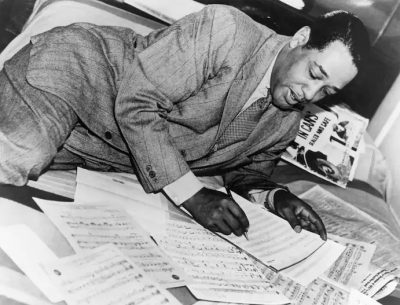 Obsessed with Duke Ellington, one man is determined to illuminate the jazz composer’s stunning output. By Eddie Dean / Wash Post
Obsessed with Duke Ellington, one man is determined to illuminate the jazz composer’s stunning output. By Eddie Dean / Wash Post
Ask David Berger about his lifelong obsession with the music of Duke Ellington, and he’ll tell you the same thing. “Duke is the best storyteller that jazz has ever had,” says Berger, a jazz composer, arranger and bandleader. “He’s got 1,500 stories out there” — by which Berger means songs.
Even casual listeners are familiar with Ellington standards, such as “Mood Indigo” and “Sophisticated Lady.” But these are only a fraction of a staggering output that ranges freely across genres and a six-decade career: from funky low-down blues and hot dance tunes to majestic spirituals; from film soundtracks and Broadway musicals to extended symphonic works, even a ballet. Read more
 Why Idris Elba Chose Comedy to Tell His Most Personal Story.
Why Idris Elba Chose Comedy to Tell His Most Personal Story.
A searing, all-star art show explores Black grief from the civil rights era to now. By Sebastian Smee / Wash Post
“Grief and Grievance: Art and Mourning in America” — the last show organized by Enwezor and his only one devoted exclusively to art by African Americans — feels retrospective rather than prescient. That makes sense, because the show, at the New Museum in New York, is about mourning, commemoration and loss. Remarkable in its quality, emotional force and concision, it features work by many of this country’s most acclaimed Black artists — among them Carrie Mae Weems, Mark Bradford, Lorna Simpson, Kerry James Marshall, Theaster Gates and Kara Walker. Read more
Related: Once Overlooked, Black Abstract Painters Are Finally Given Their Due. By Megan O’Grady / NYT
Sports
 Draymond Green strikes another blow against white control of Black athletes. By Jesse Washington / The Undefeated
Draymond Green strikes another blow against white control of Black athletes. By Jesse Washington / The Undefeated
Draymond Green’s latest speech is a sign that white control of the Black athlete is in its final days. From Jack Johnson to Jim Brown to Curt Flood to Colin Kaepernick, resistance has long been inseparable from the history of Black athletes. Over the decades, they have knocked down exploitation and inequality brick by brick. Now, athletes such as Green have their sights on the masters of a system that allows a group of nearly all-white team owners to act in ways that the owners – and much of the public – often refuse to accept from Black players. Read more
 Steph Curry Is Still Steph Curry, and He Is Pulling Off Something Remarkable. By Nick Greene / Slate
Steph Curry Is Still Steph Curry, and He Is Pulling Off Something Remarkable. By Nick Greene / Slate
Curry is in the midst of a 10-game stretch that can only be described as “diabolical.” Or “incendiary.” Or “silly.” Well, I guess it can be described a whole bunch of ways, so you should probably just refer to the numbers. As NBC Sports reporter Kerith Burke notes, that 10-pack of obscene offensive performances doesn’t even include his 62-point effort in January against the Portland Trail Blazers. That game not only marked Curry’s career high in points, but it also represented a turning point in this young season. Read more
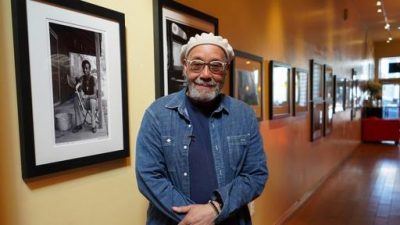
 Alexis Ohanian supports Serena Williams with ‘greatest athlete’ T-shirt. By Hayley FitzPatrick / GMA
Serena Williams defeated Simona Halep in the Australian Open on Tuesday, helping her to advance to the semifinals with Naomi Osaka on Thursday. At Williams’ match, her husband, Alexis Ohanian, wore a statement T-shirt, which he selected after
Alexis Ohanian supports Serena Williams with ‘greatest athlete’ T-shirt. By Hayley FitzPatrick / GMA
Serena Williams defeated Simona Halep in the Australian Open on Tuesday, helping her to advance to the semifinals with Naomi Osaka on Thursday. At Williams’ match, her husband, Alexis Ohanian, wore a statement T-shirt, which he selected after